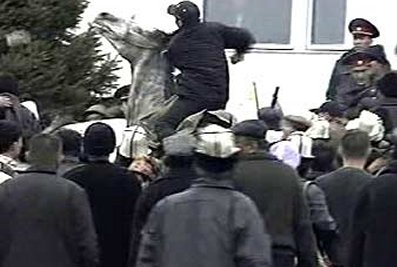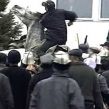
MOSCOW CRITICIZES EU AND OSCE OVER KYRGYZ ELECTION
Publication: Eurasia Daily Monitor Volume: 2 Issue: 59
By:

Russian diplomacy is pointing a finger at the European Union and the OSCE, attempting to suggest that their goal of upholding democratic election standards in Kyrgyzstan is partly responsible for the outbreak of post-election unrest. Moscow wants international organizations to lower their evaluation criteria, ostensibly to avoid provoking violence, but in reality to comfort authoritarian regimes with whom Russia feels comfortable.
In Kyrgyzstan, the OSCE/ODIHR (Office of Democratic Institutions and Human Rights) election observation mission assessed the parliamentary elections as flawed by the organization’s standards, though it stopped well short of pronouncing the elections invalid.
The EU endorsed the OSCE/ODIHR assessment. In a March 21 statement, the EU’s Presidency (currently held by Luxemburg in the six-month rotation) said that it “appeals to all sides to act non-violently and join efforts to settle their differences through open dialogue and cooperation. It urges the Kyrgyz authorities to respond calmly to the opposition’s actions, and the opposition groups to desist from any illegal actions. The EU Presidency underscores the importance it attaches to the restoration of stability. … It reiterates its readiness to cooperate with Kyrgyzstan with a view to promoting and implementing OSCE norms and principles, on the basis of mutual confidence.”
The EU’s High Representative for the Common Foreign and Security Policy, Javier Solana, issued on March 22 a similar statement, emphasizing the EU’s appeal to the Kyrgyz government and opposition to begin a dialogue, and reassuring all sides that the EU supports a political settlement. Solana’s statement also urged Kyrgyzstan’s authorities to heed the OSCE’s election assessment and to work toward correcting the flaws (EU press releases, March 21, 22).
Moscow took issue with both organizations. On March 21, a statement by Russia’s Ministry of Foreign Affairs expressed “hope that international observers, including OSCE representatives who monitored the two rounds of the parliamentary elections, will show greater responsibility in formulating their findings, so as not to give destructive elements the opportunity to use such assessments as ‘grounds’ for unlawful actions.” (Interfax, RIA-Novosti, March 21).
On March 23, Russia’s Minister of Foreign Affairs Sergei Lavrov announced that he had telephoned Solana to criticize the EU’s statements as “counterproductive,” “apt to be used by the opposition to fuel tensions in the country.” On the following day, Lavrov warned the OSCE in a statement, “We expect international organizations, in particular the OSCE, to behave responsibly, because too much depends on critical remarks made by these organizations in the wake of elections. It is necessary to work out clearly defined criteria for the appointment of chiefs of OSCE Missions … and for defining their powers. At present this is not clear, and they can make irresponsible statements.” The latter part of the statement apparently alluded to the OSCE’s Bishkek Center chief, Markus Mueller. (Interfax, March 23, 24). That same day, Russia’s Permanent Representative to the OSCE, Alexei Borodavkin, criticized the OSCE/ODIHR election observation mission for issuing “politicized assessments … that to some extent triggered the dangerous course of events in that country” (Interfax, March 24).
Moscow seems set to use this argument as part of its efforts to “reform” the OSCE by diluting the organization’s standards and blocking the adoption of its budget.




